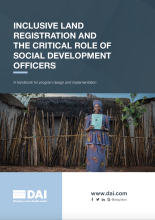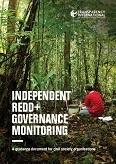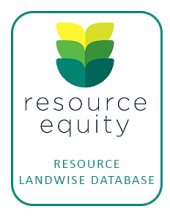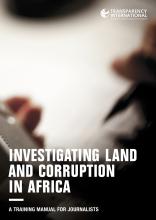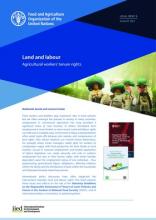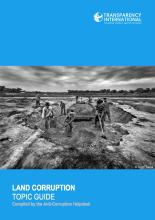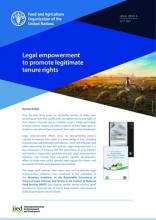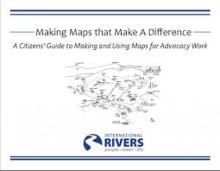Resources for Grassroots organisations
Inclusive Land Registration and the Critical Role of Social Development Officers
This guide identifies lessons learned and outlines critical steps that countries can apply to their own rural land administration programs as they strive to ensure these programs become more gender and socially inclusive. The document provides a valuable learning resource to help governments and communities implement inclusive land programs.
Independent Redd+ Governance Monitoring: A Guidance Document For Civil Society Organisations
This guidance document is an overview of key steps and considerations for the design and implementation of effective independent REDD+ governance monitoring systems. It draws on a growing body of experiences and case studies undertaken by CSOs within and outside the Transparency International movement, and across different tropical forest countries.
Indigenous Women’s Rights And The African Human Rights System: A Toolkit On Mechanisms
The toolkit has been created in order to introduce indigenous women, and the organisations which represent them, to the African system of human and peoples' rights. It highlights the different routes available to ensuring that the rights of indigenous women are valued and taken into account by the African Commission.
The toolkit is comprised of 11 Information Notes:
International Agreements and How to Build a Legal Case for Women’s Land Rights
This guide aims to help practitioners to research and use international legal norms, regional conventions, treaties and protocols to engage State officials and institutions, including local and customary legal officials; to encourage domestic compliance with State obligations; and to challenge local laws and court decisions regarding women’s rights to land and property. The guide provides the underlying international norms and relevant treaty provisions addressing women’s land rights. It also includes a series of questions focusing on how to build a case challenging local laws or a court decision which violates international or regional commitments that the state has made with regard to women’s land and property rights.
Investigating land and corruption in Africa - a training manual for journalists
The training manual provides a complete course for journalists – covering all aspects of researching, constructing, and presenting a land corruption story – which can be downloaded (for free) and used by trainers with or without prior experience of investigating land issues. It is intended for anyone that provides training or capacity-building for journalists including facilitators, trainers, lecturers and teachers.
Land and labour
Land and labour rights can intersect in multiple ways. Investments in large-scale plantations often entail trade-offs between job creation and compressions of land rights. Also, labour relations can involve tenure dimensions, for example where estate managers sublet plots for workers to complement wages with food production for their family or local markets.
Casual or seasonal employment and limited application of labour legislation can create precarity not only in workers’ employment but also in their tenure rights, with entire families dependent upon the employment status of one individual – thus perpetuating generational labour obligations, affecting relations within the family and the distribution of tasks within the household, and disproportionately impacting women. International policy discourses have often neglected these intersections.
Land Corruption - Topic Guide
This topic guide presents an overview of land corruption in rural and urban areas, focusing on:
- the social costs of corruption in land governance and the forms that corruption takes at different levels of land governance such as policy making, legal processes and administrative processes.
- the different ways in which land corruption is being counteracted. To illustrate how those anti-corruption approaches are being implemented, it includes successful experiences from all around the world with concrete ideas to fight land corruption.
The guide then compiles a list of resources to learn more about the topic, including background studies, standards and guidelines, data sets and a list of main stakeholders and actors working on the issue from different perspectives; as well as handbooks and tool-kits with practical suggestions to implement in the field.
Land Corruption Risk Mapping: Developing a handbook on how to identify and tackle corruption risks in land governance
The Land Corruption Risk Mapping Instrument is designed to raise awareness and understand how to detect corruption in land governance issues. The instrument is developed in a way that it can be applied in any Sub-Saharan African country. It is published as a handbook that gives explanations, guidance and examples.
Legal empowerment to promote legitimate tenure rights
Over the past 30 years, an increasing number of states have passed good laws that significantly strengthen the tenure rights of their citizens. However, due to multiple barriers, a high percentage of many nations’ citizens are either unaware of their legal rights or unable to use national laws to protect their rights when threatened.
Legal empowerment efforts focus on strengthening citizens’ capacity to exercise their rights in a wide variety of forums, including in government administrative procedures, courts and tribunals, and when advocating for laws and policies. Legal empowerment is a key component of ensuring that the governance of land, fisheries and forests is responsible, equitable and just. Legal empowerment initiatives may include legal education; capacity development; efforts to shape state justice systems; legal support for citizens; and promotion of citizen participation in law-making.
Making Maps that Make A Difference
The purpose of this guide is to introduce the process of mapping for communities facing destructive development projects. It also provides information on how to use maps in a campaign.


